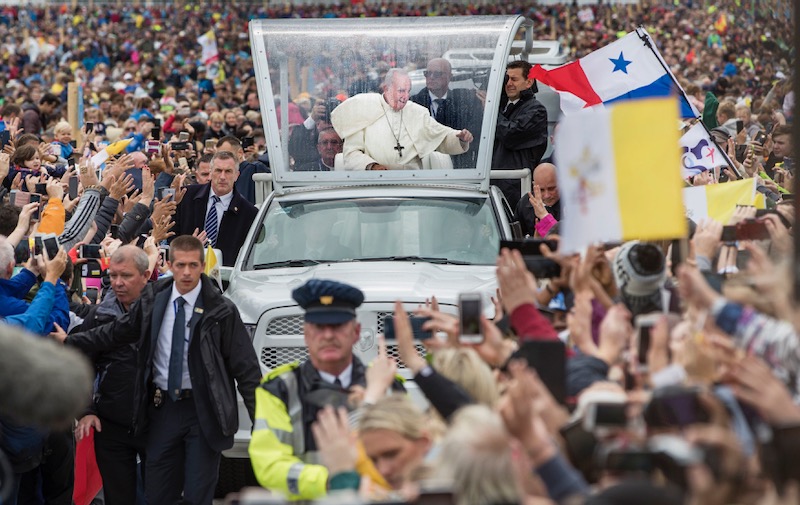The Holy See’s report into Theodore McCarrick has exposed, in forensic detail, the grave inaccuracies and falsehoods contained in Archbishop Carlo Maria Viganò’s explosive 2018 dossier against Pope Francis in which he called on the Pope to resign.
It should also jog the consciences of those bishops in the United States who, within hours of Viganò releasing his 22 August 2018 document, declared their public support for the retired Vatican diplomat and in some cases said his claims that Francis mishandled the McCarrick case were credible.
Their decision to side with the former papal ambassador to the US, and not with Francis, is one which has serious implications. It is serious because it is the duty of a bishop to safeguard communion with the Successor of St Peter and the bishops' actions allowed a damaging and inaccurate narrative to develop that the Pope had covered-up abuse.
Let us not forget the context within which Archbishop Viganò called on Francis to resign. He released his 11-page document when the Pope was at his most vulnerable: during a visit to Ireland, the Ground Zero of the abuse crisis. It was an extraordinary step, given that for decades Viganò had worked as a servant of the papacy. On that August morning, however, he pressed the nuclear button, launching an attack that was designed to cause maximum damage to the Pope.
Archbishop Viganò claimed that he warned the Pope about McCarrick’s misconduct with seminarians and priests but that Francis “continued to cover for him”. He went on to allege the Pope lifted formal “sanctions” that had been placed on McCarrick and made him a trusted adviser.
The McCarrick report is a damning indictment of the Catholic Church’s response to allegations of abuse against one of its most senior clerics. What went wrong, and why? Can the Church change in the way that it needs to? Our latest Tablet podcast features Rome correspondent Christopher Lamb.
The charges were serious and it was fair and reasonable for bishops to call for an inquiry to examine what Viganò was saying. Although it took two years, the 449-page McCarrick report provides some of that clarity through internal documents and Viganò’s own statements.
But it does not back the bishops’ assertions that Viganò is a credible witness. The report demonstrates that Francis, who was elected in 2013, never lifted any restrictions on McCarrick which had been placed on McCarrick by Benedict XVI. Formal “sanctions” had never been imposed on the globe-trotting US prelate and he was simply advised to keep a low profile and stop travelling. In any event, McCarrick ignored those “indications”.
How do we know this? Archbishop Viganò himself admits in a 2012 internal memo that sanctions against McCarrick were already a “dead letter”. The report also shows that Viganò knew all about McCarrick’s public activities. All of this debunks the Viganò's claim in his 2018 dossier that “from the time of Pope Francis...McCarrick was free from all constraints”.
Viganò continues to maintain that he verbally warned the Pope about McCarrick, a claim strongly disputed by Francis. Either way, the report states: “No one … provided Pope Francis with any documentation regarding allegations against McCarrick.”
Furthermore, the report also finds that Viganò ignored Vatican instructions to investigate a sexual misconduct allegation made by “Priest 3,” which left the priest feeling “disappointed” and that Viganò was not paying attention to the problem.
Nevertheless, in 2018 a number of bishops in the US were not willing to wait to verify the truth of the retired diplomat’s claims.
Hours about the Viganò dossier dropped, Bishop Joseph Strickland of Tyler, in Texas, wrote to his diocese saying: “Let us be clear that they are still allegations but as your shepherd I find them to be credible.” He even ordered his priests to post his statement on parish websites and across social media. Bishop Thomas Olmsted of Phoenix described Archbishop Viganò as a “man of truthfulness, faith and integrity", while the Archbishop of Oklahoma City, Paul Coakley, said he had the “deepest respect for Archbishop Viganó and his personal integrity” although admitted he did not “personal knowledge or experience of the details contained in his ‘testimony’.”
The Archbishop of San Francisco, Salvatore Cordileone, wrote in a letter to his flock: “From information I do have about a very few of the other statements Archbishop Viganò makes, I can confirm that they are true.” He went on: “I can attest that he is a man who served his mission with selfless dedication, who fulfilled well the Petrine mission entrusted to him.” Others, including the Archbishop of Denver, described Viganò as “a man of deep faith and integrity”. A more detailed breakdown of how the bishops responded can be found here.
No one in the McCarrick report comes out of it with their reputation enhanced. But the tragedy of Archbishop Viganò’s role is that he could have been the hero. In 2006, he flagged concerns about McCarrick’s behaviour and an opportunity to investigate him six years later. Instead, he weaponised the case to wage an ideological battle against Francis. Since then he has adopted an increasingly conspiratorial world view.
Given what we now know about Viganò’s testimony the onus is on the bishops to correct any misleading statements. It is even more important given Viganò’s 2018 call on the Pope to resign. The Church’s catechism couldn’t be clearer: the Pope is “the visible source and foundation of the unity both of the bishops and of the whole company of the faithful” and that the “college or body of bishops has no authority unless united with the Roman Pontiff, Peter's successor, as its head”.
If the bishops who supported Archbishop Viganò don’t want to correct the record and continue to believe the former ambassador over the Pope then perhaps they should consider offering their resignations?
xxx



 Loading ...
Loading ...
What do you think?
You can post as a subscriber user ...
User comments (0)